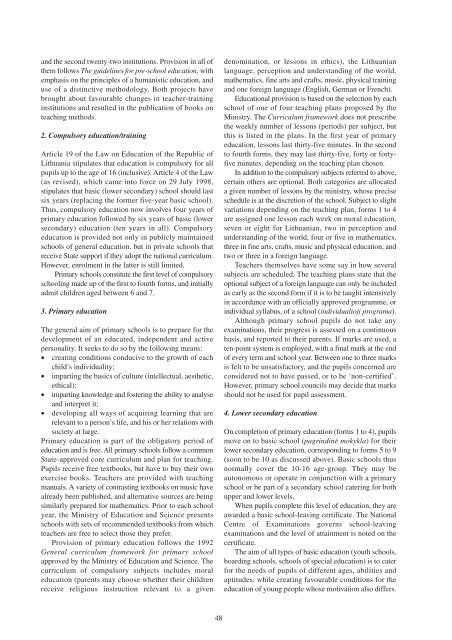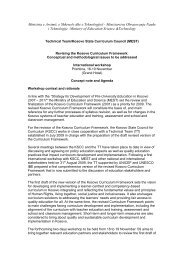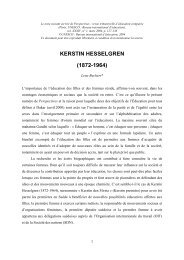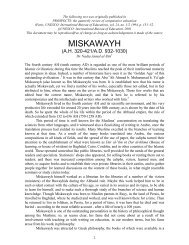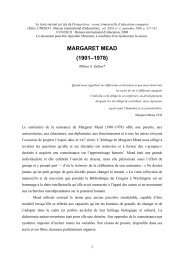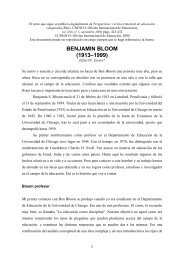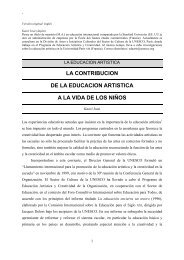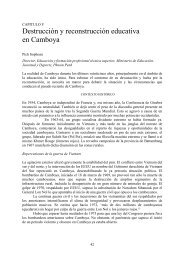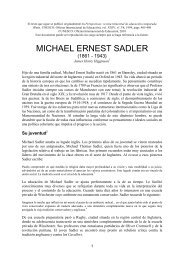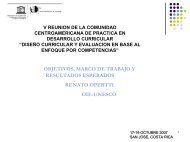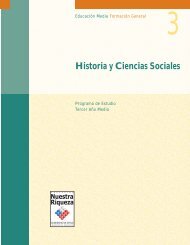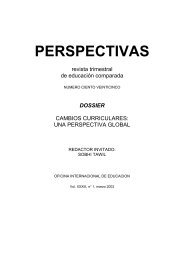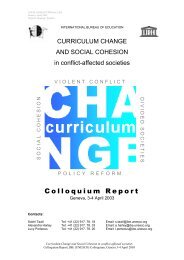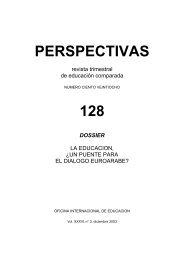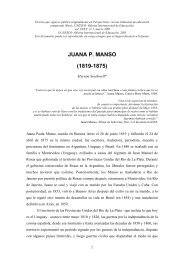Curriculum Change and Social Inclusion - International Bureau of ...
Curriculum Change and Social Inclusion - International Bureau of ...
Curriculum Change and Social Inclusion - International Bureau of ...
Create successful ePaper yourself
Turn your PDF publications into a flip-book with our unique Google optimized e-Paper software.
<strong>and</strong> the second twenty-two institutions. Provision in all <strong>of</strong><br />
them follows The guidelines for pre-school education, with<br />
emphasis on the principles <strong>of</strong> a humanistic education, <strong>and</strong><br />
use <strong>of</strong> a distinctive methodology. Both projects have<br />
brought about favourable changes in teacher-training<br />
institutions <strong>and</strong> resulted in the publication <strong>of</strong> books on<br />
teaching methods.<br />
2. Compulsory education/training<br />
Article 19 <strong>of</strong> the Law on Education <strong>of</strong> the Republic <strong>of</strong><br />
Lithuania stipulates that education is compulsory for all<br />
pupils up to the age <strong>of</strong> 16 (inclusive). Article 4 <strong>of</strong> the Law<br />
(as revised), which came into force on 29 July 1998,<br />
stipulates that basic (lower secondary) school should last<br />
six years (replacing the former five-year basic school).<br />
Thus, compulsory education now involves four years <strong>of</strong><br />
primary education followed by six years <strong>of</strong> basic (lower<br />
secondary) education (ten years in all). Compulsory<br />
education is provided not only in publicly maintained<br />
schools <strong>of</strong> general education, but in private schools that<br />
receive State support if they adopt the national curriculum.<br />
However, enrolment in the latter is still limited.<br />
Primary schools constitute the first level <strong>of</strong> compulsory<br />
schooling made up <strong>of</strong> the first to fourth forms, <strong>and</strong> initially<br />
admit children aged between 6 <strong>and</strong> 7.<br />
3. Primary education<br />
The general aim <strong>of</strong> primary schools is to prepare for the<br />
development <strong>of</strong> an educated, independent <strong>and</strong> active<br />
personality. It seeks to do so by the following means:<br />
• creating conditions conducive to the growth <strong>of</strong> each<br />
child’s individuality;<br />
• imparting the basics <strong>of</strong> culture (intellectual, aesthetic,<br />
ethical);<br />
• imparting knowledge <strong>and</strong> fostering the ability to analyse<br />
<strong>and</strong> interpret it;<br />
• developing all ways <strong>of</strong> acquiring learning that are<br />
relevant to a person’s life, <strong>and</strong> his or her relations with<br />
society at large.<br />
Primary education is part <strong>of</strong> the obligatory period <strong>of</strong><br />
education <strong>and</strong> is free. All primary schools follow a common<br />
State-approved core curriculum <strong>and</strong> plan for teaching.<br />
Pupils receive free textbooks, but have to buy their own<br />
exercise books. Teachers are provided with teaching<br />
manuals. A variety <strong>of</strong> contrasting textbooks on music have<br />
already been published, <strong>and</strong> alternative sources are being<br />
similarly prepared for mathematics. Prior to each school<br />
year, the Ministry <strong>of</strong> Education <strong>and</strong> Science presents<br />
schools with sets <strong>of</strong> recommended textbooks from which<br />
teachers are free to select those they prefer.<br />
Provision <strong>of</strong> primary education follows the 1992<br />
General curriculum framework for primary school<br />
approved by the Ministry <strong>of</strong> Education <strong>and</strong> Science. The<br />
curriculum <strong>of</strong> compulsory subjects includes moral<br />
education (parents may choose whether their children<br />
receive religious instruction relevant to a given<br />
48<br />
denomination, or lessons in ethics), the Lithuanian<br />
language, perception <strong>and</strong> underst<strong>and</strong>ing <strong>of</strong> the world,<br />
mathematics, fine arts <strong>and</strong> crafts, music, physical training<br />
<strong>and</strong> one foreign language (English, German or French).<br />
Educational provision is based on the selection by each<br />
school <strong>of</strong> one <strong>of</strong> four teaching plans proposed by the<br />
Ministry. The <strong>Curriculum</strong> framework does not prescribe<br />
the weekly number <strong>of</strong> lessons (periods) per subject, but<br />
this is listed in the plans. In the first year <strong>of</strong> primary<br />
education, lessons last thirty-five minutes. In the second<br />
to fourth forms, they may last thirty-five, forty or fortyfive<br />
minutes, depending on the teaching plan chosen.<br />
In addition to the compulsory subjects referred to above,<br />
certain others are optional. Both categories are allocated<br />
a given number <strong>of</strong> lessons by the ministry, whose precise<br />
schedule is at the discretion <strong>of</strong> the school. Subject to slight<br />
variations depending on the teaching plan, forms 1 to 4<br />
are assigned one lesson each week on moral education,<br />
seven or eight for Lithuanian, two in perception <strong>and</strong><br />
underst<strong>and</strong>ing <strong>of</strong> the world, four or five in mathematics,<br />
three in fine arts, crafts, music <strong>and</strong> physical education, <strong>and</strong><br />
two or three in a foreign language.<br />
Teachers themselves have some say in how several<br />
subjects are scheduled. The teaching plans state that the<br />
optional subject <strong>of</strong> a foreign language can only be included<br />
as early as the second form if it is to be taught intensively<br />
in accordance with an <strong>of</strong>ficially approved programme, or<br />
individual syllabus, <strong>of</strong> a school (individualioji programa).<br />
Although primary school pupils do not take any<br />
examinations, their progress is assessed on a continuous<br />
basis, <strong>and</strong> reported to their parents. If marks are used, a<br />
ten-point system is employed, with a final mark at the end<br />
<strong>of</strong> every term <strong>and</strong> school year. Between one to three marks<br />
is felt to be unsatisfactory, <strong>and</strong> the pupils concerned are<br />
considered not to have passed, or to be ‘non-certified’.<br />
However, primary school councils may decide that marks<br />
should not be used for pupil assessment.<br />
4. Lower secondary education<br />
On completion <strong>of</strong> primary education (forms 1 to 4), pupils<br />
move on to basic school (pagrindinë mokykla) for their<br />
lower secondary education, corresponding to forms 5 to 9<br />
(soon to be 10 as discussed above). Basic schools thus<br />
normally cover the 10-16 age-group. They may be<br />
autonomous or operate in conjunction with a primary<br />
school or be part <strong>of</strong> a secondary school catering for both<br />
upper <strong>and</strong> lower levels.<br />
When pupils complete this level <strong>of</strong> education, they are<br />
awarded a basic school-leaving certificate. The National<br />
Centre <strong>of</strong> Examinations governs school-leaving<br />
examinations <strong>and</strong> the level <strong>of</strong> attainment is noted on the<br />
certificate.<br />
The aim <strong>of</strong> all types <strong>of</strong> basic education (youth schools,<br />
boarding schools, schools <strong>of</strong> special education) is to cater<br />
for the needs <strong>of</strong> pupils <strong>of</strong> different ages, abilities <strong>and</strong><br />
aptitudes, while creating favourable conditions for the<br />
education <strong>of</strong> young people whose motivation also differs.


